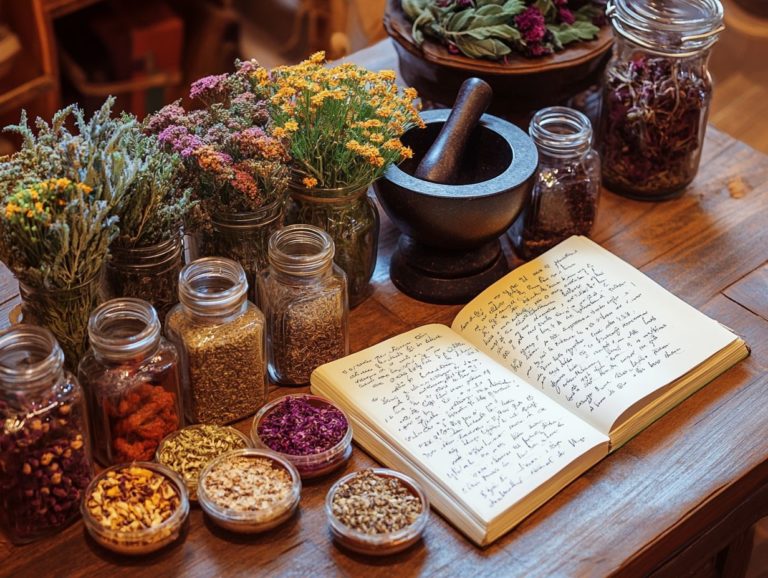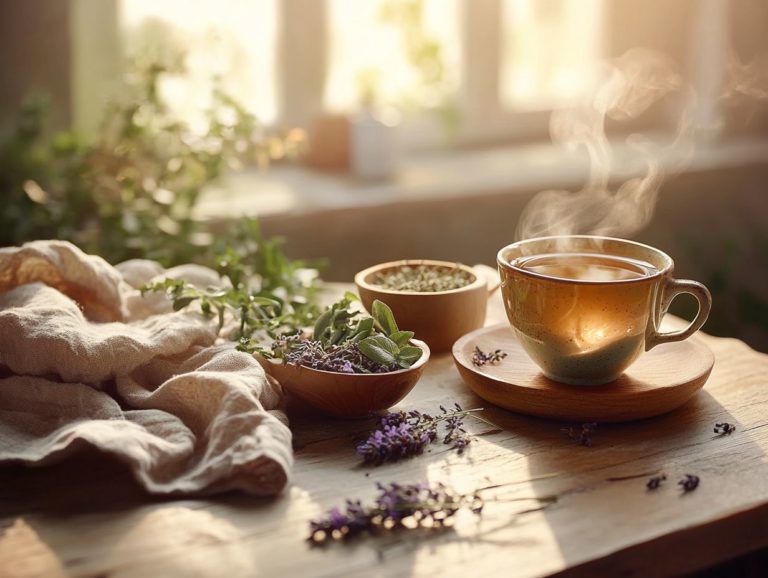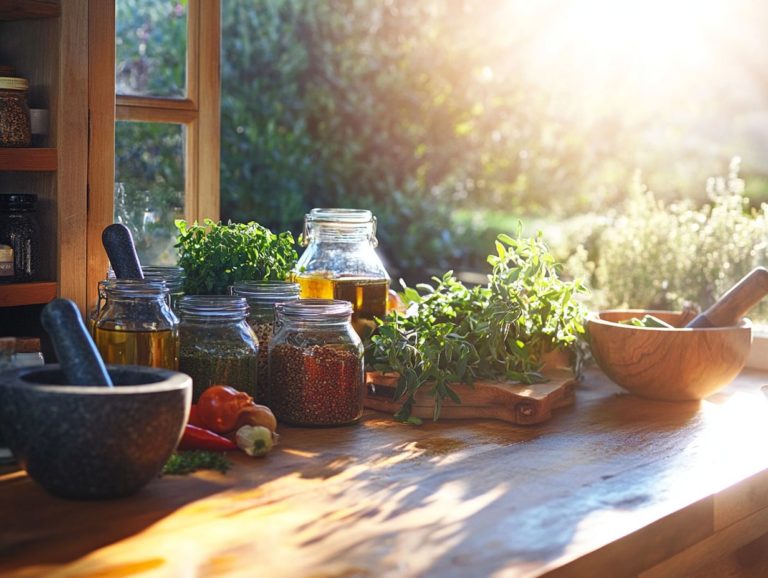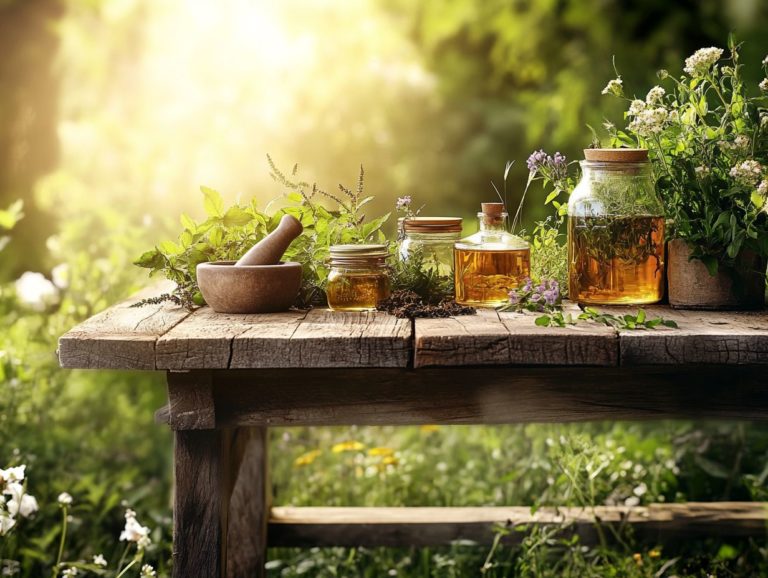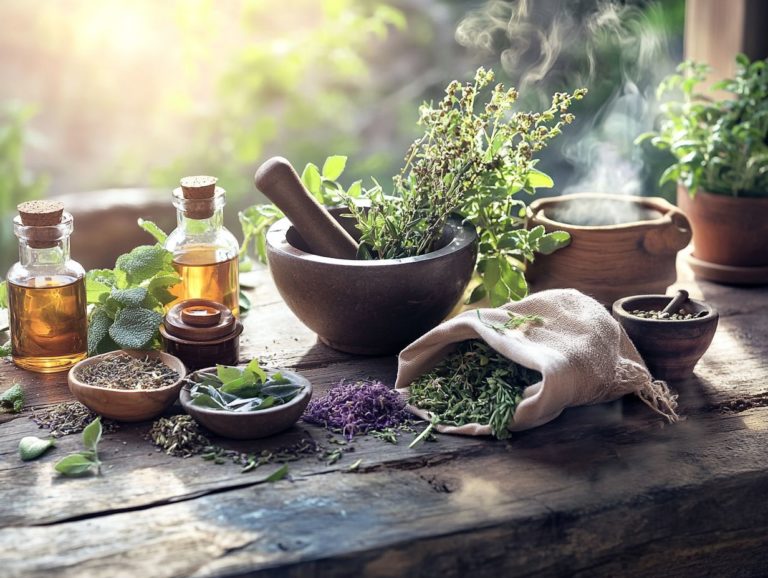How to Make Herbal Vinegars for Health
Looking to enhance your kitchen experience? Discover the magic of herbal vinegars! Herbal vinegars are a delightful and healthful addition to your kitchen, offering a unique way to harness the benefits of herbs, including various flavored vinegar options like herb vinegar and cleaning vinegar.
This article delves into the remarkable health benefits these infusions provide, guides you in selecting the right herbs tailored to your specific needs, and shares both traditional and modern techniques for crafting herbal vinegars.
You ll discover tips for seamlessly incorporating these tangy mixes into your daily diet, along with essential vinegar storage and safety information.
Start your exciting journey to better health with herbal vinegars today!
Contents
Key Takeaways:
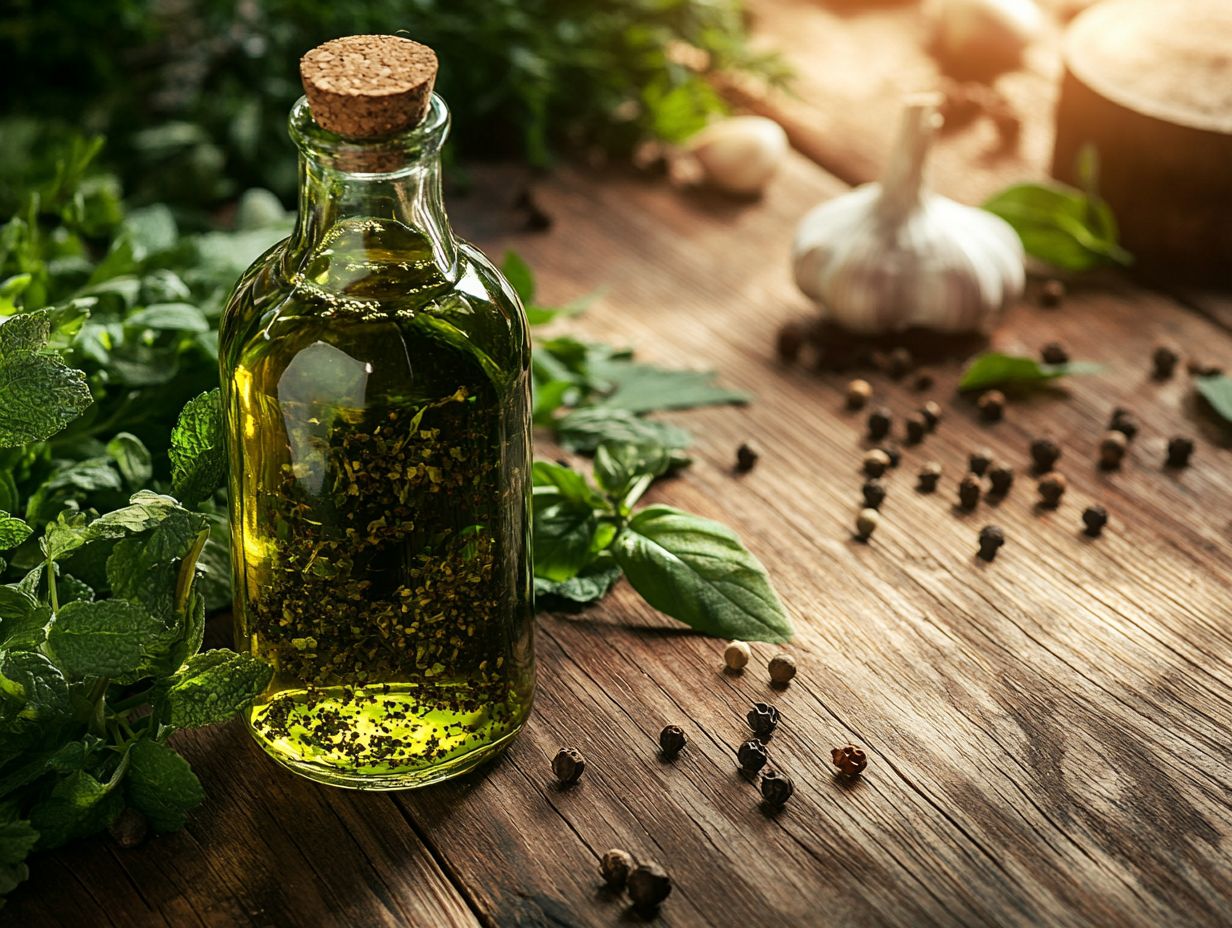
- Herbal vinegars offer numerous health benefits such as boosting immunity and aiding digestion.
- Choose the right herbs for your specific health needs, like peppermint for headaches or ginger for nausea.
- There are various methods for making herbal vinegars that easily fit into your daily routine.
The Benefits of Herbal Vinegars
Herbal vinegars, crafted from fresh herbs and blended with vinegars like white wine vinegar or apple cider vinegar, provide a wealth of nutritional benefits while serving as versatile staples in your plant-based cooking repertoire. These infused vinegars elevate the flavors of your dishes, especially in salad dressings, and offer herbal remedies that support your overall health and wellness.
Their applications extend beyond the kitchen, making them essential tools for cleaning and home care. This versatility highlights their invaluable role in enhancing your everyday living experience.
Overview of Health Benefits
The health benefits of herbal vinegars are impressive, enhancing digestion and delivering essential nutrients, making them a powerful addition to your vegan diet. These natural mixes not only elevate the flavors of your meals but also significantly contribute to your overall well-being. For instance, apple cider vinegar, rich in probiotics, supports gut health and helps you feel fuller longer.
Herbal vinegars infused with garlic cloves or turmeric provide impressive anti-inflammatory properties, boosting your immune system. Incorporating nettle or dandelion vinegars into your meals can enhance detoxification while ensuring you receive vital vitamins and minerals.
Embracing these herbal elixirs can lead to vibrant health improvements and a more invigorated lifestyle.
Choosing Herbs for Vinegar Infusions
Choosing the right herbs for your vinegar infusions, such as rosemary, thyme, or basil, is essential for maximizing both flavor and health benefits. Each herb has distinct properties that enhance your homemade vinegar.
Fresh herbs like basil, tarragon, and dill pair wonderfully with garlic cloves and various vinegars, creating exquisite infusions that elevate your culinary masterpieces while providing therapeutic advantages.
Best Herbs for Different Health Needs
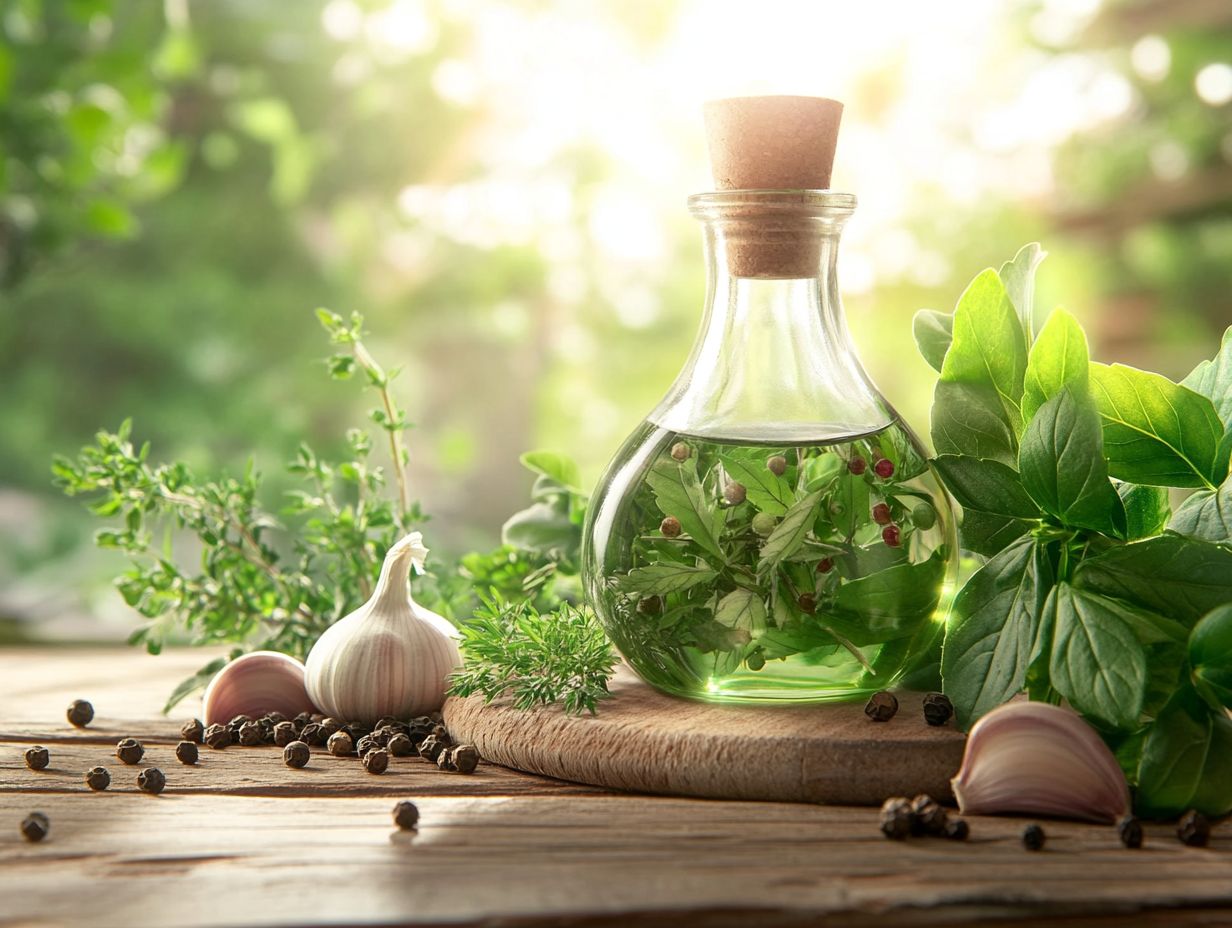
Different herbs can cater to various health needs. It s vital to select the right ones for your herbal vinegar infusions. For instance, use sage for its soothing properties.
Take rosemary, for example. It s celebrated for its digestive benefits. This natural remedy helps soothe stomach discomfort and stimulate appetite, making it a wonderful choice for herb infusion.
In contrast, lavender shines with its calming properties. It’s frequently used to help with anxiety and improve sleep quality. Lavender can also create wonderful herbal remedies when infused in vinegar.
By integrating these specific herbs into your infusions, you can create targeted solutions tailored to your health concerns. Whether you re seeking relief from digestive issues or a soothing aid for relaxation, understanding the benefits of each herb empowers you to craft effective and delightful blends. Popular choices include those used for salad dressings.
Methods for Making Herbal Vinegars
Crafting your own herbal vinegar is a rewarding endeavor. This process blends both traditional and modern techniques, inviting creativity and personalization into your culinary repertoire, especially in vegan cooking.
The swift infusion method with fresh herbs is one option. This method quickly draws out flavors. A more gradual approach also exists, which deepens those flavors over time. Homemade vinegar effortlessly enhances your plant-based recipes, providing distinct flavor profiles that elevate your salad dressings and marinades to new heights. For those interested in creating your own flavors, you can learn how to prepare herbal syrups at home, which is perfect for marinating tofu or tempeh.
Traditional and Modern Techniques
Both traditional and modern techniques present unique avenues for crafting herbal vinegars, each with its own complexity and time investment.
Consider the classic steeping method. You infuse fresh or dried herbs like basil, thyme, or rosemary in vinegar for several weeks. This allows delightful flavors to meld beautifully, creating a flavorful vinegar for potato salad.
If you’re short on time, a quicker infusion can be just as effective. Gently heat vinegar with your chosen herbs over low heat for a few minutes to extract flavors rapidly, which is perfect for those busy moments. For more detailed guidance, check out this resource on how to create your own herbal remedy.
When selecting the right vinegar for your herbal infusion, options like apple cider vinegar, rice vinegar, and champagne vinegar shine thanks to their balanced acidity and mild flavors. Proper storage is crucial for preserving the potency of your infusion. Use dark glass bottles and keep them in a cool, dark place to extend their shelf life. For more on making effective herbal preparations, check out these simple steps to create herbal-infused oils.
To streamline your culinary adventures, consider using a recipe card. This handy tool lists both ingredients and infusion methods, ensuring perfect results every time and making it easier to replicate those flavorful vegan recipes.
Using Herbal Vinegars for Health
Incorporating herbal vinegars into your daily diet can elevate both flavor and health. They are essential in plant-based recipes and a vegan lifestyle, enriching your culinary experience.
These versatile ingredients shine in salad dressings and add depth to marinades for tofu. They also serve as distinctive flavor enhancers in an array of dishes, contributing to a more enriching culinary experience. This includes popular dishes like potato salad and vegan sour cream.
Incorporating Vinegars into Your Diet
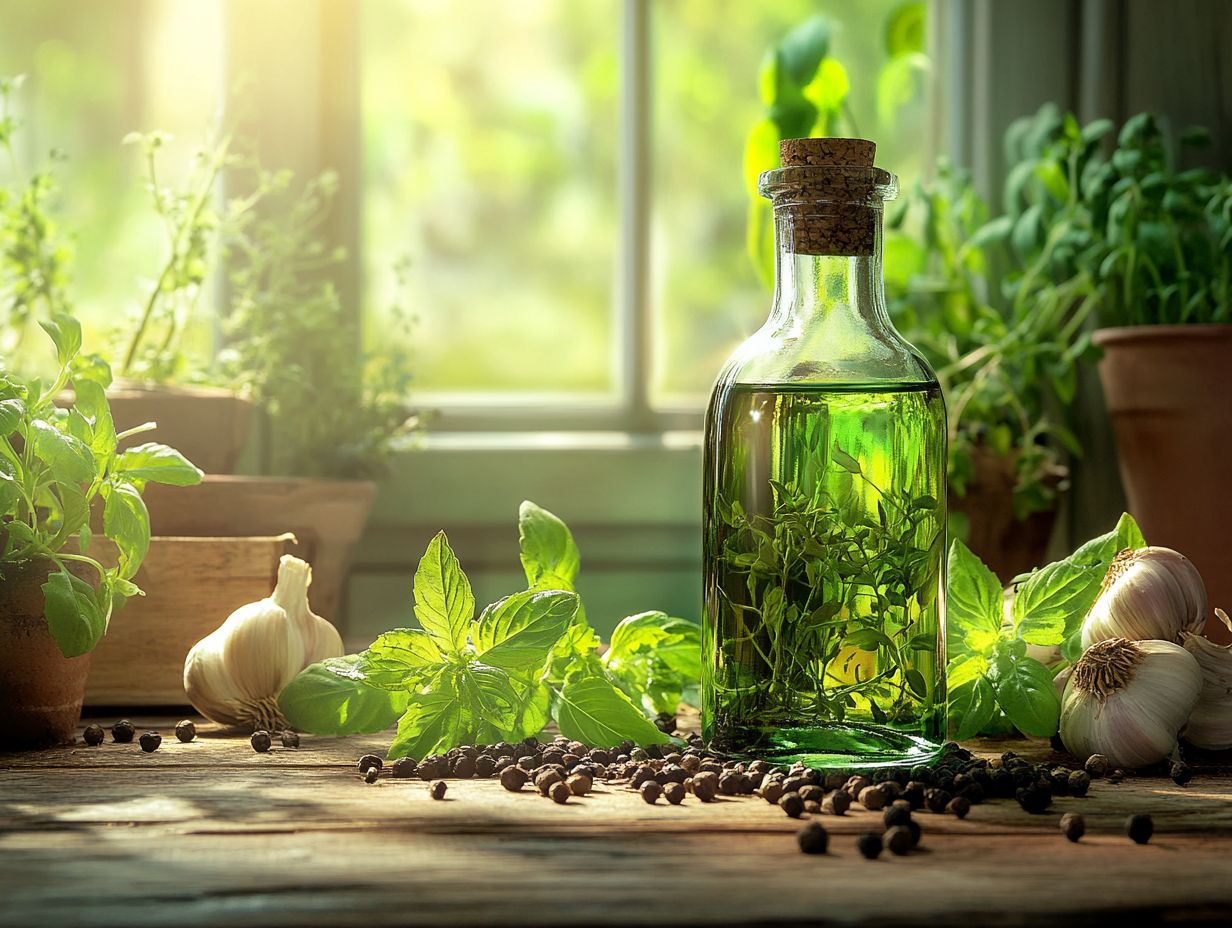
Incorporating herbal vinegars into your diet can be wonderfully effortless. Just think about adding them to your salad dressings or using them as marinades for dishes like marinating tofu or tempeh for a delightful meal.
These tangy infusions will elevate a simple green salad. They can transform roasted vegetables into a delectable side dish, making them a must-have in vegan cooking and a great choice for your next gathering!
Imagine whisking garlic-infused vinegar into a vinaigrette with olive oil, salt, and pepper creating a zesty dressing that takes a quinoa salad, bursting with vibrant, fresh ingredients, to the next level. It s perfect for summer gatherings!
When you marinate tofu or tempeh in a blend of herbal vinegar, soy sauce, and maple syrup, you ll find a tasty protein that s great for grilling. This highlights the benefits of a vegan diet. Not only do these vinegars intensify flavors, but they also offer health benefits like aiding digestion and promoting a healthy gut. It’s a smart choice for anyone embracing a plant-based lifestyle, especially with options like homemade vinegar to spice up your meals.
Safety and Storage of Herbal Vinegars
Store herbal vinegars properly to keep them fresh and safe. Understanding the safety and storage requirements of herbal vinegars is essential, as proper handling can significantly extend their shelf life and preserve their delightful flavors!
Knowing how to store your infused vinegar be it garlic-flavored or crafted from fresh herbs ensures that it remains safe for culinary applications and is ready for use in your favorite vegan recipes. These vinegars also work well as cleaning agents around your home!
Precautions and Shelf Life
Understanding the shelf life of your herbal vinegars and taking the appropriate precautions is vital for maintaining their quality and safety.
Different types of herbal vinegars, whether infused with garlic, rosemary, or chili, can exhibit varying shelf lives depending on their ingredients and preparation methods. You can expect most herbal vinegars to last up to one year when stored properly. For those looking to enhance their herbal preparations, learning how to create herbal tinctures easily is also beneficial. However, those infused with fresh herbs may not enjoy the same longevity, so it’s vital to keep track of your vinegar storage.
To preserve their freshness, keep the bottles tightly sealed and store them in a cool, dark place, away from direct sunlight. This ensures each infusion remains flavorful. Be vigilant for signs of spoilage, such as changes in color, sediment formation, or unpleasant odors, as these can indicate deterioration, particularly in your herb-infused blends. For those interested in creating these blends, learning how to make herbal remedies with dried herbs can enhance your culinary adventures, allowing you to enjoy their benefits in your favorite recipes.
Frequently Asked Questions
What are herbal vinegars?
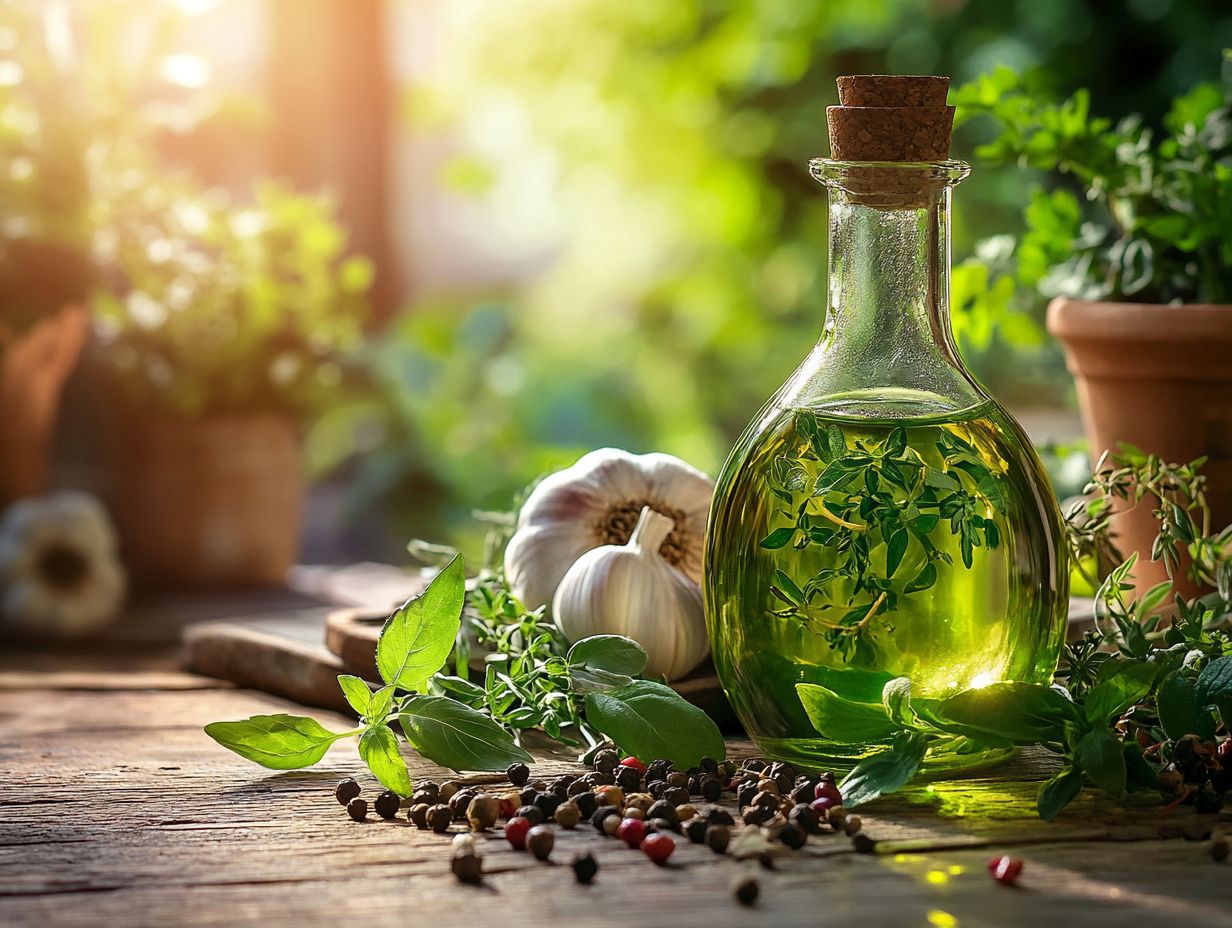
Herbal vinegars are made by infusing vinegar with various herbs, spices, and other ingredients. They can provide a range of health benefits, such as improving digestion, boosting the immune system, and reducing inflammation!
What materials do I need to make herbal vinegars?
To make herbal vinegars, you will need a glass jar with a tight-fitting lid, organic apple cider vinegar, a selection of fresh or dried herbs, and a cloth for straining. Options include herbs like basil and tarragon.
Can I use any type of vinegar to make herbal vinegars?
While apple cider vinegar is commonly used for making herbal vinegars, you can also use other types such as white wine vinegar or rice vinegar. Just make sure to use organic vinegar without any added preservatives or flavorings!
How do I make herbal vinegars?
To make herbal vinegars, place your chosen herbs in a clean glass jar and cover them with vinegar. Seal the jar and store it in a cool, dark place for 2-4 weeks, shaking it gently every few days. Strain the vinegar and transfer it to a clean jar for storage.
What are Some Popular Herbs for Herbal Vinegars?
Popular herbs for making herbal vinegars include rosemary, thyme, oregano, basil, and sage.
Feel free to get creative! Try unusual herbs like lavender, chamomile, or nettle for a unique twist.
How Can I Use Herbal Vinegars for Health?
Herbal vinegars are versatile. Use them in salad dressings, marinades, or as a daily tonic.
You can mix them with water to create a refreshing hair rinse or skin toner for added benefits.

